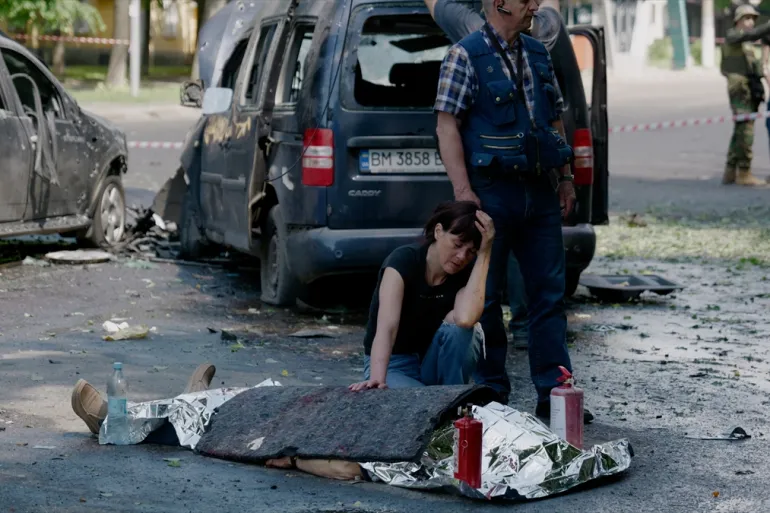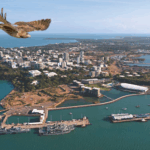Russia-Ukraine War Escalates as Conflict Enters 1,196th Day
Strikes on Sumy and Kharkiv leave civilians dead
The Russia-Ukraine war entered its 1,196th day with intense escalations and increasing global involvement. Russian forces launched deadly strikes on Sumy and Kharkiv, killing and injuring dozens. The Ukrainian Interior Ministry confirmed four civilians lost their lives in Sumy, while two others perished in Kharkiv’s Chistovodivka following residential fires sparked by shelling.
Crimea Bridge attacked as Ukraine claims structural damage
Ukraine’s SBU security service targeted the underwater supports of the Crimea Bridge in a high-profile attack, causing what they described as “severe damage.” However, Russia’s Ministry of Transport claimed the bridge was functioning again, saying that operations had “resumed after temporary closures” without offering specifics.
Conflicting claims on battlefield control in eastern Ukraine
Meanwhile, Russia’s Defence Ministry stated that its troops had seized Kindrativka in the Sumy region and Ridkodub in eastern Ukraine. In stark contrast, Ukraine has denied such territorial losses and continues its counteroffensives in multiple regions.
Moscow alleges false flag operation and Western complicity
The Kremlin has blamed Ukraine for the Crimea Bridge explosion, asserting there was “no damage” and denouncing it as a false flag operation. Russian Foreign Ministry spokeswoman Maria Zakharova accused the West of complicity, stating, “Western countries, NATO and the collective West supplied weapons and coordinates for terrorist attacks.”
NATO involvement heightens geopolitical tension
On the battlefield, the situation remains volatile. Russia accuses NATO of indirect involvement, further heightening tensions as the war’s ripple effects reach deeper into international diplomacy.
UK pledges 100,000 drones as part of massive support package
In military aid developments, the United Kingdom has pledged 100,000 drones to Ukraine, part of a larger £4.5 billion ($6 billion) military support package. Defence Secretary John Healey emphasized this contribution as crucial for Ukraine’s battlefield advantage.
Germany pushes for more air defence systems for Kyiv
Germany is also intensifying its support, with Defence Minister Boris Pistorius confirming a fresh push to source additional air defence systems for Ukraine. Pistorius stated that Berlin is lobbying the US and other allies to donate Patriot systems or similar defence technologies.
NATO invites Ukraine to critical summit in The Hague
In diplomatic spheres, NATO has extended an invitation to Ukraine for an upcoming summit in The Hague. Though it’s not yet confirmed whether President Volodymyr Zelenskyy will attend, the invitation underscores Ukraine’s growing strategic importance.
Trump denies prior knowledge of drone strikes on Russia
In Washington, White House spokesperson Karoline Leavitt clarified that President Donald Trump “was not” informed in advance of Ukraine’s drone attack on Russian airbases. When asked about his stance, she added, “The president does not want to see this war prolonged.”
Trump’s envoy warns of growing risk of escalation
Keith Kellogg, Trump’s Ukraine envoy, issued a stern warning, saying the “risk of escalation is going way up” following Ukrainian drone strikes on nuclear-capable bombers within deep Russian territory. These strikes mark a significant shift in tactics.
NATO faces strategic crossroads amid rising pressure
NATO’s urgency to strengthen defences now faces a critical test, according to US Ambassador Matthew Whitaker, who warned “Russia is already preparing for its next move beyond Ukraine.” This signals a wider concern for regional stability as the conflict evolves.
EU proposes to extend protections for Ukrainian refugees
The European Commission has proposed extending Ukrainian refugees’ rights to stay within the EU for another year, while also acknowledging that their special protection status will eventually conclude.
US Senate prepares fresh sanctions push against Russia
Meanwhile, US Senate Majority Leader John Thune said the Senate will begin crafting a new sanctions bill aimed at forcing Russia to negotiate in earnest. The bill is being coordinated closely with Trump’s foreign policy team.
Russia seeks to influence global opinion at UN meeting
In parallel, Russia’s UN mission has announced an informal Security Council meeting to examine “ideological root causes” of the war in Ukraine. The Kremlin’s move is widely seen as an attempt to shape international narratives.
EU-aligned nations increase pressure through sanctions
Switzerland announced sanctions against 17 individuals and 58 entities in line with the EU’s most recent package. Caretaker Dutch Prime Minister Dick Schoof also affirmed ongoing military and humanitarian support for Ukraine despite his government’s internal political collapse.
Future remains uncertain as global stakes rise
As the Russia-Ukraine war surpasses 1,190 days, new developments in warfare, diplomacy, and foreign aid indicate a volatile path forward. The days ahead may bring greater escalation or a shift toward negotiated outcomes. The international community remains deeply engaged, facing urgent decisions on how to contain and resolve one of the world’s most enduring modern conflicts.






